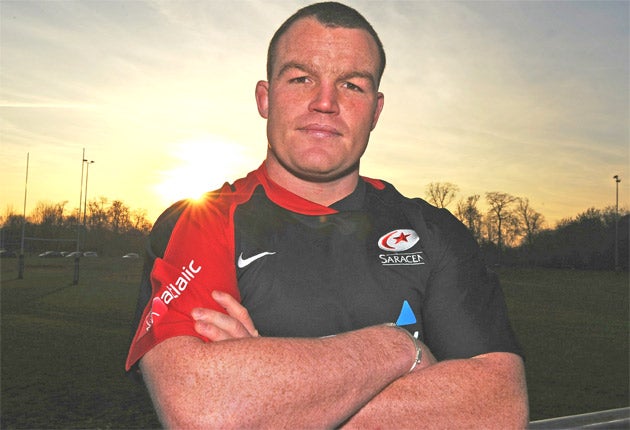Matt Stevens: 'Weirdly, the drug ban was one of the best things to happen to me'
The England prop tells Chris Hewett how two lost years have made him a better person

The Matt Stevens affair was not in the least bit funny – his cocaine habit, exposed in all its depressing detail when the England prop failed a doping test after a Heineken Cup game in 2008, raised serious questions about the world of professional rugby that the sport's movers and shakers are still struggling to answer – but there is always someone out there with a sense of humour. Stevens returned to training yesterday after completing a two-year ban to find himself confronted by a drug-testing team. "I thought these things were meant to be random," he said with the weakest of smiles.
Happily, his discomfort was momentary. Back in big-time union with a new club, Saracens, and with a whole new sporting experience behind him having scaled considerable heights in the disciplines of Brazilian Jiu-Jitsu and "submission wrestling", he described himself as a "more considered person, a more reserved person", adding: "There's more humility about me now. In a weird, ironic kind of way, the ban was one of the best things that ever happened to me. I've had incredible support from people who had every right to say: 'You've let us down, get out of our sight'. It's been quite a process of self-evaluation and it's been very difficult, but the fact that no one gave me a wide berth helped a lot."
Stevens had as much going for him as any rugby player in Europe. Capped as a 21-year-old and part of the British and Irish Lions squad who toured New Zealand in 2005, the naturalised South African was the epitome of the modern-day prop, his technical expertise at the set-piece matched by his extravagant footballing skills in the loose. If some wondered whether he was blessed with the true warrior spirit, no one doubted his potential to redefine the role of the tight forward.
Whether he can recover the things he lost to the white powder remains to be seen, but the effort begins on Monday night when he plays for the Saracens second-string against Wasps. Can he possibly be ready this quickly? "I feel I'm ready," he replied. "I'll feel like I've been run over by a car, but for the last two weeks, I've been hitting the scrum machine 50 times a day every day."
There was no realistic prospect of Stevens staying at Bath, the club who smoothed his path into the professional game and saw him as a player around which a new, vibrant team could be built. He remains close to some of the senior players at the Recreation Ground – he has a coffee shop business with the hooker Lee Mears and received a good deal of support during the dark days from the lock Danny Grewcock – but his decision to move on, leaving the personal baggage behind, was inevitable. His partner, with whom he has two young daughters, is a Londoner who wanted to stay in the capital. Saracens, he feels, are the perfect fit.
Apart from anything else, an old friend and colleague from Bath, the former England captain Steve Borthwick, is currently a pillar of the rugby community at Sarries. "He was one of the first people on the phone after I was banned," Stevens recalled. "He's a very empathetic person – a consummate professional, but compassionate too. He's always thinking about other people and he doesn't see things in black and white. He's one of the reasons I was so keen to come here."
According to the Saracens coaches, including the former cross-code international Andy Farrell, there is no doubting Stevens' fitness. "You'd have thought he would have been gun-shy in his first training session, but he was making his hits and demanding the ball all the way through," reported Farrell, admiringly. Stevens puts this down to his wrestling. "I went to California for the Brazilian Jiu-Jitsu world championships and had my arse shown to me," he said, wincing at the memory. "But I still had that competitive drive and wanted to try something that mimicked the kind of aggression you find in rugby. It was good for me, and I'll be interested to see how those skills play now I'm back in union."
Was there a point when Stevens felt he had parted from rugby for good? "It was on the cards because I was in a bad place," he admitted. "But after three months of my ban, I realised I had unfinished business in the sport. Now, I just want to get started."
Join our commenting forum
Join thought-provoking conversations, follow other Independent readers and see their replies
Comments